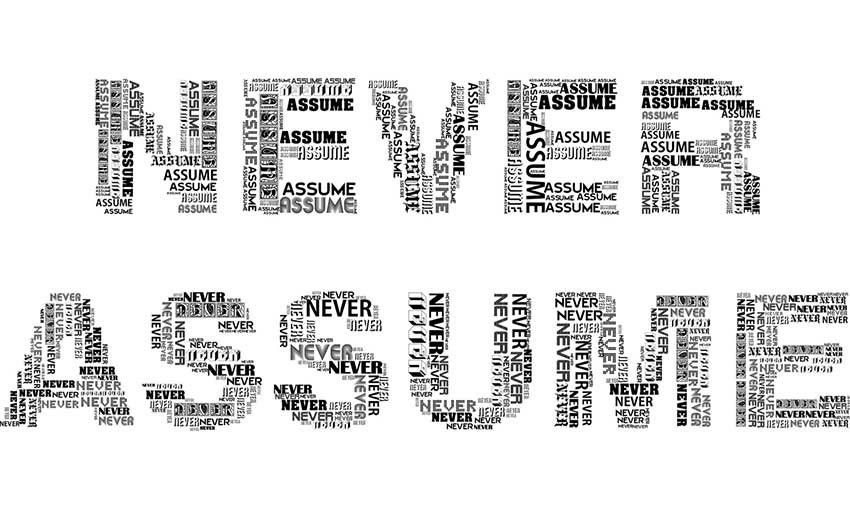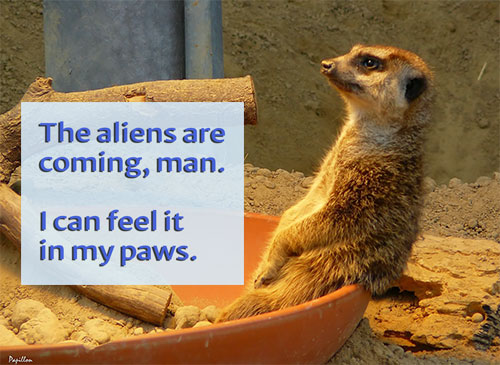
We partner with trusted companies that offer products which help our readers achieve their goals! If you purchase through our partner links, we get paid for the referral at no additional cost to you! Read our disclosure for more info.
It’s normal for people to make assumptions, but have you considered that doing it may actually be destroying the world?
What exactly is an assumption? Essentially, it’s the belief that the nature of something exists a certain way without proof to validate it.
For instance, I assume you just landed your awesome new job because you read 7 Signs It’s time For You to Change Careers. And if you didn’t read it, then I assume it’s because you’re over 65 years old and never had a job.
Make sense at all? Probably not. But it does to me. This is the nature of assuming things. And there are times when doing it can be harmful. Let’s talk about why.
Here are 5 reasons why making assumptions is destroying the world:
1. Assumptions slow the progress of society
“Words are powerful. Dangerous. Use them wisely, if not, less.”
Sources vary when humans first started speaking words. Some researchers debate it could have started as late as 50,000 years ago. Others suspect even earlier, toward the beginning of the human genus, over 2 million years ago.
There’s no real archaeological evidence to support it, so researchers infer this based on other data we have. They infer it by hypothesizing using scientific data, not by assuming it based on an—”ah, what the heck, it sounds right”—method.
The later method has no structure, validity, and is purely subjective, giving an opinion purely from the scope of things one believes.
Assumptions are a display not of what we know, but what we DON’T know.
Thousands of years ago, no one really knew much, so assuming things was OK for them to do. They had no science yet. Now, our society has advanced to a point where we use scientific reasoning.
We don’t have to assume things anymore. As far as science is concerned, we hypothesize things.
Imagine if our innovators today, for example Elon Musk, made plans to inhabit Mars based on the—”ah, what the heck, it sounds right”—method? Like, “Ah, what the heck, Mars is round—that’ll work.”
Yeah, you could count me out on that trip. Fortunately, most of those with power don’t use that method in regard to advancing civilization. They don’t assume things will be OK. They assure it using scientific reasoning. Let’s keep it that way.
What’s the takeaway?
Assuming things as far as science is concerned, is a thing of the past. There’s no reason to spectate, when we can use scientific reasoning, which gives much better results.
2. Assumptions cause personal disconnection
Have you ever been driving your car, and, suddenly, someone cuts you off just so they could stop at the red light before you? Or they tailgate you because you are going only 50mph, when the speed limit is 45mph?
Most of us call those types of drivers—well, rude.
“How dare they cut me off? Jerk.”
But the thing is, little did you know, that person was speeding because their house was burning down. And the guy at the coffee shop fifteen minutes before—the one who slammed the door on your face—is the firefighter attending the scene.
Rough scenario. But it holds truth in how reality works compared to how we often believe it works.
Frequently assuming things makes you lack empathy for others.
When you assume things about people, you are essentially forcing their point of view through your eyes. But you are doing it without them existing, and without their experiences which make the perspective unique.
This creates a barrier of judgement that divides you from them. You feel less what they feel, and you do it for your own gain, to assume that the universe exists only as you see it. In other words, you totally misunderstand them.
Making assumptions boils down to lacking awareness.
Be aware of the way things work beyond your point of view. Put yourself in other people’s shoes for a moment. Don’t always assume the worst in people.
What’s the takeaway?
Sometimes we assume why people act the way they do, or why they behave in a certain manner, when we would behave differently. The truth is, there’s no universal way things work.
Your perspective is not the only truth, and you should try to be aware and focus on the truths, reasons, and intentions that make up other people’s perspectives, too.
3. Assuming things skews political intentions
Being assumptive is a proven factor of misinterpreting politics and the intentions of leadership.
Sure, our metaphorical President was caught saying something to her assistant that isn’t professional. OK, it was very unprofessional and un-President-like.
I’ll be more specific: Ms. President told Joe she’d rather kick a baby than repeat Tuesday’s speech about climate change. And she seemed serious.
That’s pretty harsh. I mean, I think babies are pretty cool. But, does our assumption and judgement of her character from an alien viewpoint really mean she can’t accomplish her job as President?
Her words are hurtful because we assume she isn’t empathizing with what we believe is normal behavior, normal thoughts.
Does her comment on babies really have anything to do with why she opposed additional funding in West India? Does she secretly have something against babies in West India?
If she said she’d rather kick a big acorn, would her Indian funding decision be acceptable?
Maybe, maybe not. That’s why we shouldn’t assume things.
What’s the takeaway?
Assuming the behavior of political entities without deep inside knowledge puts you at a disadvantage of believing in their ability to make decisions.
4. Assumptions create a domino effect
There’s no doubting that social media has become a huge part of our lives. Some people love this fact. Others, not so much.
The thing about any group of people being able to exchange massive amounts of information is that, truth or lie, the information is out there; for good.
It’s like lighting a short wick to a sea of gasoline.
All it takes is one viral post, article, or image to create a domino effect of public assumptions.
By nature, we have adopted a herd mentality in regard to judgement. It’s been going on since the beginning of time, and even more so, now, with the internet.
It’s so easy to take a sentence and completely blow it out of context and assume its meaning, as if we were the originator of those words. Now, all the sudden, we are telling our friends about what we just learned.
Perhaps you are the one who lit the wick. Before you know it, the entire world shares the same opinion as you. And of course, that’s because you told it from your perspective.
If only they knew your blabbering was forged from your assumption, and a potentially misled one.
Too late now. Your assumption already did damage.
Once something goes viral, it’s over. It’s nearly impossible to shake the collective beliefs of the herd.
What’s the takeaway?
When you assume things without definite reason, and you let your voice be heard, there’s a strong possibility that misinformation can be spread. This misinformation is enough to change entire civilizations.
5. Making assumptions hinders learning
Assuming things hurts others, but it also affects you. It takes away from your analytical approach to learning, which hinders your initiative to validate information.
We create our own truths based off our emotions and influences around us, regardless of our knowledge of the topic.
Don’t have an answer? No problem. Just assume one.
This sort of goes hand-in-hand with disregarding evidence because the sources don’t align with our beliefs. Example? Religion.
We’ve got atheists who squander the idea of higher powers because they assume no proof.
“Blasphemy! The proof is within you—just look deeper!” – says the believer.
And we’ve got spiritual and religious followers who assume the existence of higher powers on the very same foundations and bases that atheists oppose it.
Creating truth purely on the plane of assumptive logic.
It’s not a war where a victor will prevail, and an answer will reach absolution. Simply, it’s a hyped up subject with lots of spectators, who have lots say, and with nothing to lose, because nobody can prove them wrong.
No one will win THAT war. The good news? Nobody HAS to win.
Our civilizations have been operating this way for thousands of years—this conflict of assuming that things work the way they do because to us, they seem logical.
So, if you have to assume something, do it in moderation. Pan metron ariston.
Only assume things that you intend to validate in some way. Don’t assume something just for the heck of it. If you’re going to assume aliens exist, then make it a point to help humanity actualize some answer.
Otherwise, you become just another statistic—some single-minded fool out there making stuff up, just to fit random things neatly into some world you’re creating.
What’s the takeaway?
When we assume things work a certain way because we simply believe it to be true, even without proof, then we inhibit our learning process. Assuming things takes away from our drive to find absolute answers to the questions which require investigation.
Conclusion
We’re all in this together. Try not to assume things about people’s behaviors, intentions, and especially, don’t make assumptions about why things happen in the world. Make not doing it one of your goals when setting your new years resolutions.
Always consider that the things happening around you may exist completely different than how you perceive them, or how you ever imagined they could exist. It might help you become a better person, and it will make our world a healthier place to live in.
That’s all, my friends. Until next time.
Here’s a quick recap of 5 reasons making assumptions is destroying the world:
- Slows the progress of society.
- Causes personal disconnection.
- Skews political intentions.
- Creates a selfish domino effect.
- Hinders learning and initiative.
That’s all folks! Thanks for reading.
Feel free to comment below if you liked this article on 5 reasons making assumptions is destroying the world. I’d love to take questions or suggestions on other content you’d like to see on eHowdy!
Share Post ❤️
Aaron McCloud


Most Popular

10 Unique Reasons You are Misunderstood [How To Prevent It]

10 Brain Foods That Boost Your Mood and Mental Clarity

10 Ways To Find Your Passion and Purpose In Life Today










